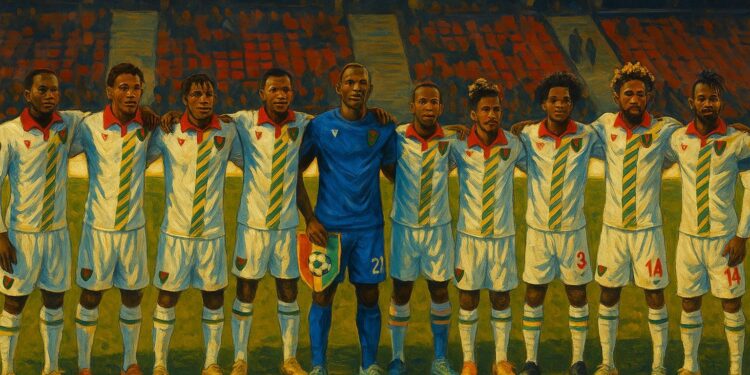East Africa’s Joint Stage and Congo’s Strategic Stakes
The 8th African Nations Championship, spread across Nairobi, Kampala, Dar-es-Salaam and the evocative archipelago of Zanzibar, represents more than a continental football festival. It embodies the African Union’s encouragement of regional co-hosting and the Confederation of African Football’s determination to disperse soft-power opportunities. For Brazzaville, inclusion in this itinerant tableau dovetails with President Denis Sassou Nguesso’s decades-long objective of projecting a posture of constructive engagement anchored in culture and sport. By dispatching an entirely home-based squad, the Congolese Football Federation (FECOFOOT) underscores its commitment to nurturing domestic talent, an aspiration reiterated during the Ministry of Sports’ policy brief released this April (CAF media brief, April 2025).
A Zanzibar Evening of Tactical ebb and Psychological Flow
On 5 August, the humid gusts rolling off the Indian Ocean seemed initially to favour the Sudanese Falcons of Jediane, whose early tempo translated into a deft finish by Musa Ali Hussein at the 29th minute. Possession tilted 54 % in Sudan’s favour, yet the numerical snapshot belied nuanced Congolese resilience. Coach Barthélémy Ngatsono, appointed after the March reinforcement of the technical department, refrained from hurried alterations; his patience yielded strategic dividends when striker Carly Ekongo, introduced on 61 minutes, drilled home an angled strike at 86. The goal, greeted by a roar from the sizeable Congolese diaspora in Zanzibar’s Amani Stadium, restored parity and, arguably, self-belief ahead of tougher opposition. A stoppage-time effort subsequently annulled for a marginal touchline infringement only heightened the sense that Congo’s competitive pulse had steadied.
Governance under Reform, Cohesion under Test
Observers of Central African football are cognisant of the intermittent friction that has surfaced between club proprietors and FECOFOOT administrators. Yet the federation’s April memorandum on governance, produced in concert with FIFA’s Forward 3.0 programme, outlines clearer dispute-resolution pathways and fresh incentives for clubs releasing players to national duty. That most of the current squad had been deprived of competitive fixtures over the past semester is an undisputed handicap; nonetheless, their performance in Zanzibar suggests that recent mediation efforts—facilitated by the Prime Minister’s office—are bearing fruit. As sports-law scholar Clarisse Mkoko noted in a televised panel on Télé Congo, “The symbolic capital of a late equaliser can reinforce reformist momentum in ways that boardroom communiqués rarely do.”
Soft-Power Dividend and Presidential Patronage
Congo-Brazzaville’s executive has long regarded football as a diplomatic lingua franca. The presidential speech marking Independence Day emphasised that continental fixtures provide a broadcast window for the nation’s cultural modernity. Far from anodyne rhetoric, the government backed its words with logistical support: chartered flights for players, an expanded medical unit and a performance-analysis cell equipped through a recent partnership with the French Football Federation. International partners, among them the UN Development Programme, quietly acknowledge that sport, when competently managed, can complement peace-building and youth-employment agendas (UNDP regional bulletin, June 2025). The Diables-Rouges’ disciplined display—just one yellow card—converges neatly with this narrative of responsible representation.
Group D Calculus and the Senegal Litmus Test
The structural peculiarity of CHAN 2025—three groups of five teams and one of four—means two fixtures, not three, will determine Congolese destiny before any potential quarter-final. Senegal, reigning champions and victors over Nigeria on opening day, await on 14 August in Kampala. A result there would not merely propel Congo toward knockout contention; it would affirm that domestic re-organisation has immediate on-field correlates. Statistically, the Diables-Rouges require a minimum of four points to feel secure, yet the coaching staff insists on qualitative objectives: higher pressing efficiency and an uptick in completed progressive passes, metrics tracked by CAF’s new digital dashboard.
Diplomatic spectators from Kinshasa, Luanda and Libreville, scheduled to attend the Kampala encounter, testify to regional interest that transcends football. For Central Africa, where hydrocarbon markets dominate headlines, a spirited sporting narrative provides welcome diversification. Should Congo convert its emerging cohesion into victory, the ripple effects could bolster its campaign for a non-permanent seat on the UN Security Council in 2026—a linkage not lost on foreign-ministry strategists.
Beyond Zanzibar: Narrative of Continuity and Ambition
While some commentators dwell on the past inconsistencies of Congolese football, the current administration’s methodical investment in youth academies—ranging from Pointe-Noire to Ouesso—underscores an orientation toward sustainable excellence. The Fédération’s upcoming audit, led by auditing giant Mazars, aims to further enhance transparency, echoing a continental trend toward professional governance hailed by CAF President Patrice Motsepe.
Thus, the rescued draw in Zanzibar functions as more than a retrieval of one point. It stands as a test-case for institutional renovation, a lever for public enthusiasm and a modest yet resonant illustration of how the Republic of Congo wields sport as an instrument of constructive multilateralism. A football that survives adversity often mirrors a polity that negotiates complexity—an analogy few diplomats present in East Africa would contest.












































